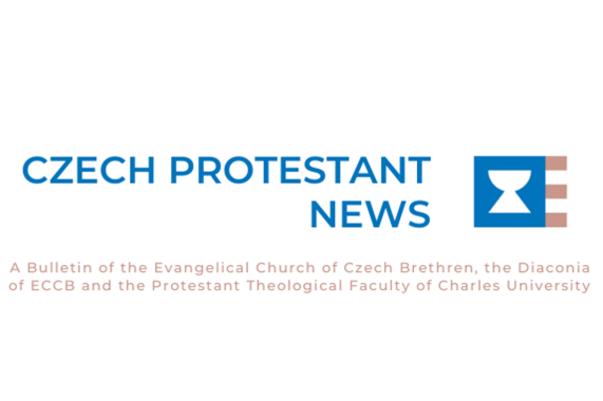Bulletin 54 – Christmas 2021
Editorial
Dear readers,
the tornado that hit Moravia this summer was unprecedented in our country. It was graded EF4, the second strongest on the scale, and the extent of the damages really was quite devastating. There are of course countries in the world where people are used to tornadoes, hurricanes and such natural phenomena and they know how to prepare for them and what to do. Not in the Czech Republic though. Hurricanes probably don’t even exist here and a tornado has occurred before, but not with such force. With the help of Mr Google, I’ve learned that a similar disaster last hit Prague in 1119 (!), as marked in the Czech Chronicle by Cosmas. Luckily enough, such terrors are often accompanied by acts of kindness that are worth remembering. The financial aid sent to the destroyed villages was immediate and its extent was as extraordinary as the strength of the whirlwind itself. I am happy to see that apart from the Adra and Člověk v tísni charity organisations, the ECCB’s Diaconia contributed a major amount. Large-scale, efficient aid was also sent from abroad, especially from German churches. The work of the above-mentioned organisations is of utmost importance, but they would be powerless without the help of civic society. The vast amounts of money that were collected by these organisations were sent by regular people from all around our country, which is something we need to be truly grateful for. Let us simple hope tornadoes do not become a phenomenon that we will have to get used to in the Czech Republic.
Ecumenical Bulletin 54 – Christmas 2021
I would also like to draw attention to the personality of Svatopluk Karásek. You will find out who he was in the article about him. I would just like to point out that his personality, his activities, and, above all, his songs influenced a truly large amount of people, certainly not just Christians. The communist regime did not break him, as much as it strived to do so.
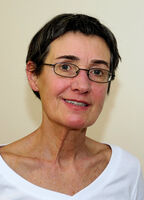 Summer is long since gone, Christmas is near and with it the joy that cannot be taken away by a tornado or by any other sorrowful events. Let us hold on to this belief.
Summer is long since gone, Christmas is near and with it the joy that cannot be taken away by a tornado or by any other sorrowful events. Let us hold on to this belief.
Wishing you peace on behalf of the Editorial Board,
Jana Plíšková
EVANGELICAL CHURCH OF CZECH BRETHREN (ECCB)
 P. O. Box 466, Jungmannova 9,
P. O. Box 466, Jungmannova 9,
CZ 111 21 Praha 1, Czech Republic
Tel: (+ 420) 224 999 215(216); Fax: (+ 420) 224 999 219
E-mail: ekumena@e-cirkev.cz
Web page: www.e-cirkev.cz
The foundations of the Evangelical Church of Czech Brethren stem from the Hussite church (1431–1620) and the Unity of the Brethren (1457–1620). The Evangelical Church of Czech Brethren (ECCB) was established in 1918, when the Lutheran and Calvinist wings of the local protestant creed were united in one. Their existence, however, had not been legal until Joseph II issued his Patent of Toleration in 1781, following a long and tough anti-reformation campaign that began in 1620. Even after issuing the Patent of Toleration, Protestants still had to face many restrictions, which would only be lifted following the Protestant Patent of 1861.
At the time of its establishment, the ECCB had 250,000 members, the number increased to 325,000 in 1938. Today, the church is divided into 14 seniorates and has a total of approximately 250 congregations and 100,000 members. The church is headed by a six-member Synodal Council, elected for a six-year period, represented by the Synodal Senior and Synodal Curator.
Hit by destructive forces and taken aback by a wave of solidarity
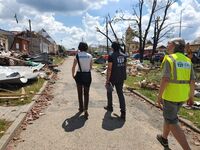 On Thursday, the 24th of June 2021, the Hodonínsko and Břeclavsko regions were hit by a completely unexpected natural disaster. After a series of bad thunderstorms, a strong tornado passed through Southern Moravia. Apart from the material damages reported, there were many injured and some casualties as well. 2000 constructions (houses, churches, factories, etc.) were damaged, including a railway corridor. Hundreds of trees fell, countless roofs were carried away. This is something we are not used to seeing happen in our country.
On Thursday, the 24th of June 2021, the Hodonínsko and Břeclavsko regions were hit by a completely unexpected natural disaster. After a series of bad thunderstorms, a strong tornado passed through Southern Moravia. Apart from the material damages reported, there were many injured and some casualties as well. 2000 constructions (houses, churches, factories, etc.) were damaged, including a railway corridor. Hundreds of trees fell, countless roofs were carried away. This is something we are not used to seeing happen in our country.
Already before midnight on the day of the catastrophe, members of the ECCB’s management and Diaconia assembled for an extraordinary meeting in order to issue immediate aid to those struck by the disaster. 500,000 CZK were released from the humanitarian aid fund and a fundraising campaign was organised through the Humanitarian and Development Cooperation Centre, raising 26 million crowns in the course of two months.
Diaconia concluded an agreement on a coordinated aid approach together with nine other organizations that were raising funds for the cause. In the first two weeks following the tornado, 34 of Diaconia’s volunteers worked over 1,000 hours in the affected region.
The immediate wave of solidarity was so extraordinary that the ECCB Diaconia’s Humanitarian and Development Cooperation Centre decided to organize an ecumenical service to offer spiritual support, consolation and hope to those who lost their loved ones or their homes. It was also an expression of gratitude to those that provided this hope through their help: the emergency services, the army, the volunteers…
The service took place on Monday, the 30th of August from 7 p.m. at the Saint James church in Moravská Nová Ves. Ministers of the ECCB, the Roman Catholic Church, the Evangelical Methodist Church, the Czechoslovak Hussite Church and the Seventh-Day Adventist Church took part in the service.
Three weeks later, in mid-July, a wave of strong thunderstorms and torrential rains caused flash floods in Western Germany, Belgium and the Netherlands.
Over two hundred lives were lost in the catastrophe and even a month after the events, authorities were still reporting dozens of people as missing. Given the extent, these floods are among the most severe natural disasters Europe has seen in the past quarter of a century.
The Synodal Council immediately contacted its partner churches in Germany to express its sympathy. The Council also asked the ECCB’s churches to pray for the affected regions and at its meeting, it decided to provide direct support in the amount of 500,000 CZK from the Social and Charity Aid Fund.
The ECCB transferred its funds directly to the account of the German Diaconia Rheinland-Westfalen-Lippe, which works in the affected regions.
Congregations of the ECCB as well as individuals also joined in collecting the money for Germany. The collection was organised by the ECCB’s Diaconia and the donations on the transparent account amounted to another 555,000 CZK by mid-August.
“We thank you sincerely for this generous gesture of support and solidarity! The damages caused by the floods are unquantifiable. The photos from the affected locations only give us a hint of how badly distressing the situation must be. Again and again, we are in awe of the stories we get from people, stories full of hope and trust in the midst of all this suffering. One of these stories is your support through thought, prayer and financial aid,” as stated in one of the letters of gratitude that arrived from Germany to our church’s central office.
We thank all the contributors for their will to overcome sadness with solidarity and to spread hope across state borders.
Jiří Hofman
Sváťa-Fest, 31 July 2021
 Svatopluk Karásek (*1942) served as a minister of the ECCB, first in a village called Hvozdnice, later in a town named Nové Město pod Smrkem. He remained a true pastor and a distinctive witness to Christ even after his state permission was withdrawn and he was working as manager at the Houska castle; neither did his attitude and personality change when he was imprisoned. In 1980, he emigrated to Switzerland, where he served at the reformed churches in Bonstetten and Zurich. After the 1989 Revolution in Czechoslovakia, he returned and resumed his work as minister, first at the Bethlehem Chapel in Prague, later again in Nové Město pod Smrkem and then again in Prague, at the St Salvator church. Svatopluk died on the fourth Sunday of Advent, on the 20th of December 2020.
Svatopluk Karásek (*1942) served as a minister of the ECCB, first in a village called Hvozdnice, later in a town named Nové Město pod Smrkem. He remained a true pastor and a distinctive witness to Christ even after his state permission was withdrawn and he was working as manager at the Houska castle; neither did his attitude and personality change when he was imprisoned. In 1980, he emigrated to Switzerland, where he served at the reformed churches in Bonstetten and Zurich. After the 1989 Revolution in Czechoslovakia, he returned and resumed his work as minister, first at the Bethlehem Chapel in Prague, later again in Nové Město pod Smrkem and then again in Prague, at the St Salvator church. Svatopluk died on the fourth Sunday of Advent, on the 20th of December 2020.
When we were bidding him farewell at the Salvator church on the 23rd of January 2021, at a funeral with a limited number of guests due to COVID-19, the idea came up that a Sváťa – fest should be organised to honour Svatopluk and to be able to say a proper good-bye, as well as to commemorate his wide range of work as minister and songwriter, for any of his friends and listeners, no matter how close or distant. The programme started on the 31st of July with a service at the Prague Salvator church and continued with a music festival in a village near prague, Lahovičky. Since it was the middle of the summer holidays, not all those whose lives were influenced by Sváťa’s friendship, sermons, his openness and his songs, were able to attend. In spite of this, both of the venues were full.
In church, Zdeněk Bárta, a fellow dissident from Northern Bohemia, shared his memories of Sváťa. He pointed out Sváťa’s detached view of things, his inner freedom, his unusual kindness towards others and his struggle to always seek truthfulness in civic issues. Minister Josef D. Beneš, Sváťa’s Swiss colleague, remembered the adventurous beginnings of Sváťa’s stay in Switzerland, his first sermons in German, and how these resonated among the slightly reserved local churchgoers, and mainly how he managed to connect with the people because preaching the Gospel always had a deep, existential meaning to him.
The following guests continued with this theme, remembering the deep authenticity of Sváťa’s expression, pointing out how his civic non-conformity during the period of communist normalisation should not be taken for granted, and also the fact that the cool, easy-going Sváťa was a deeply humble man before God.
The festival in Lahovičky started at 4 p.m. Sváťa’s songs were sung by Karel Vepřek, Bobeš Rössler, followed by the bands Oboroh and, naturally, Svatopluk. The underground community, joined by several members of the church congregation, was dancing happily, drinking beer and bringing back to life songs like Ženský ty jsou fajn /Broads are great/, Say no to the devil, and some of the less familiar ones.
During the normalisation era, Sváťa’s songs and sermons showed the path of truthful Christianity, they worked like an anti-toxin against the narrow-mindedness sometimes encountered in churches, as well as against nationalism, xenophobia or consumerism, which certain Christians as well as church leaders are often lured by nowadays.
Sváťa fest was a real opportunity to give thanks for Sváťa’s life. With joy, we also remembered Svatopluk as Christ’s witness who had the ability to actually live the gifts of freedom, generosity and truthfulness, as shown by Christ himself, in spite of the fearfulness and hopelessness of the era that Sváťa lived in.
Tomáš Trusina
The Evangelical Church of Czech Brethren has new leaders
 During a festive service in Brno on Saturday, November 20, 2021, a new synodal council of the Evangelical Church of Czech Brethren was inaugurated. The assembly was held under emergency measures due to the ongoing COVID-19 pandemic. That's why the ceremony was broadcast live online.
During a festive service in Brno on Saturday, November 20, 2021, a new synodal council of the Evangelical Church of Czech Brethren was inaugurated. The assembly was held under emergency measures due to the ongoing COVID-19 pandemic. That's why the ceremony was broadcast live online.
The Synod Council is the highest, six-member governing body of our church. It is led by a synodal senior (clergyman) and a synodal curator (layman). The members of the council – three clergy and three lay people – are elected by the synod once every six years.
The newly appointed members of the Synod Council take over as the church goes through the process of transition to self-financing. The state financing of churches, a reality of the past now, has led to preserving the historic locations of the congregations. These, however, no longer correspond with the current demographic situation and require restructuring. At the same time, however, it also offers a great opportunity to rethink things and look for new approaches and new solutions and thus, to learn about the regained freedom and responsibility. This task will also lie on the shoulders of this Synod Council for the next six years.
Half of the six-member Synod Council has been replaced. Pastors Pavel Pokorný, Ondřej Titěra and layman Jiří Schneider were already active in the previous one. New faces were added for the upcoming term: pastor Roman Mazur, who had previously worked as senior of the Prague seniorate, and two lay people – Jana Šarounová, who studied special education and is the curator of the Prague-Vinohrady church, and Simona Kopecká, lawyer and assistant preacher from Silesia.
New composition of the Synod Council for the period 2021 to 2027
Pavel Pokorný, Synod Senior
Pavel Pokorný (1960) was the pastor of the church in Prague-Střešovice from 2000 to 2021. His previous place of work was Trutnov (1987–1999), where he started after his studies and basic military service. During his one-year stay in the United States, he focused on pastoral care. He also worked as a hospital chaplain for the mobile home hospice Cesta domů. He is married and has four children.
Jiří Schneider, Synod Curator
Jiří Schneider (1963) is the former director of the Aspen Institute in Prague. He previously worked in Czech diplomacy. He studied geodesy and cartography at CTU and religion studies at the University of Cambridge. He is married and has three children.
Ondřej Titěra, 1st Deputy Synod Senior
Ondřej Titěra (1964) has been the pastor of the church in Jablonec nad Nisou since 2014. Prior to that, he worked as a pastor in Miroslav (1998–2014) and in Vilémov at Golčův Jeníkov (1989–1998). He is married and has four children.
Simona Kopecká, 1st Deputy Synod Curator
Simona Kopecká (1969) graduated from the School of Justice in Kroměříž and the Evangelical Theological Faculty of Charles University in Prague, majoring in evangelical theology. She works as an assistant lawyer in a law firm in Ostrava and before that she worked as a senior court clerk. She is the vice-curator of the ECCB parish church in Opava and an assistant preacher. She is a widow and has two adult children.
Roman Mazur, 2nd Deputy Synod Senior
Roman Mazur (1974) worked as a pastor in Ostrava (1996–2006) and since 2006 he has been a pastor in Prague-Libeň. For the years 2009–2021, he was twice elected a senior of the Prague Seniorate. He is married and has three children.
Jana Šarounová, 2nd Deputy Synod Curator
Jana Šarounová (1964) works as a special pedagogue-speech therapist and deputy director in a school counselling facility for children and young people with speech defects. She has been the curator of the congregation in Prague-Vinohrady since 2004 and has also served in the church's pastoral council. She is married and has two adult children.
Jiří Hofman
Visiting the Father’s House on the way to see our compatriots in Ukraine
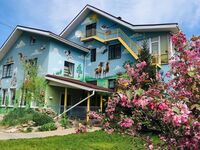 In the nineties of the previous century, after Ukraine became an independent country, a successful surgeon and academician, Roman Korniiko, was active in Kyiv. He was not willing to live with the fact that hundreds of orphans were languishing homeless on the streets of the city, so he started seeking help for them. He would look for married couples that would be able to take care of them and he also tried to raise awareness of the issue. The attitude of the authorities was disapproving. He was often interrogated by the police and beaten several times. Yet he did not give up and managed to build up a group of like-minded Christians with whom he constructed a house to accommodate the orphans with their foster parents.
In the nineties of the previous century, after Ukraine became an independent country, a successful surgeon and academician, Roman Korniiko, was active in Kyiv. He was not willing to live with the fact that hundreds of orphans were languishing homeless on the streets of the city, so he started seeking help for them. He would look for married couples that would be able to take care of them and he also tried to raise awareness of the issue. The attitude of the authorities was disapproving. He was often interrogated by the police and beaten several times. Yet he did not give up and managed to build up a group of like-minded Christians with whom he constructed a house to accommodate the orphans with their foster parents.
They named the house, located in a village on the suburbs of Kyiv, the “Father’s House” – the house of our Father in heaven. It is almost hard to believe how many hundreds of children lived there and found their new families thanks to this project. Married couples, either childless or with children, sometimes already adults themselves, would take orphans from the streets to be a part of their families. A school was also founded in the house. Today, parents from the village strive to have their children enrolled at the Father’s House. Later, another building was added to the beautiful, colourful and joyful house. The newer building provides other care for the children, such as medical care, physiotherapy, or a psychologist.
I had a chance to visit this wonderful community in the summer, on my way to see our Protestant compatriots in Bohemka and Veselynivka. Originally, we were supposed to go there with Jan Dus. When war was starting at Donbas, Jan Dus, head of the ECCB Diaconia’s humanitarian centre at the time, helped acquire some shipping container housing units for the Father’s House, which were transported from Zlín. These living units helped to accommodate migrants from East Ukraine, primarily mothers with children from Donbas – some of them still live there at present. In the end, Jan Dus didn’t come with me to Ukraine. Diaconia asked him to be in charge of coordinating the necessary aid in one of the Moravian villages hit by the tornado – Hrušky.
We travelled to Ukraine with Pavel Kalus, minister at the Prague-Žižkov congregation, and with his son, Jan. We did not cancel our planned visit at the Father’s House and we are still moved by the warm welcome we received. One of the ladies living at the housing units from Zlín is actually part of the management of the Father’s House today and it was her who took care of us throughout the two days and showed us everything the Father’s House provides.
An oasis for children from the street
I was amazed at what the founders were capable of creating despite the adversities they were facing at the beginning. Roman says they would not have been able to achieve any of it without help from above. They put together a team of people that knows how to work with children. It is not necessary to mention the friendly atmosphere of the House: it was quite apparent all around and it was clear that the work here has been successful for over 20 years now. Many of the “kids” who once found a home here are now employees or assistants of the House and of the entire community. Roman refers to them as „graduates“.
Many people found it hard to understand how somebody could possibly give up their academic medical career to work with kids from the street. Roman told us that when they were starting out, an armed response unit was sent to the House to search the entire premises. The next day, the head of the operation came to apologize and said they had been ordered to install drugs around the house. He couldn’t do it.
Gradually, the public opinion on the House began to change. Nowadays, you will find several awards hanging on the wall, for example „Hero of the Republic of Ukraine“.
This year, an overall renovation of the first house is taking place. The kids are currently accommodated at the huge premises of the presidential residence. The President, Volodymyr Zelenskyj, is letting them use one of the older pavilions of the residence. The children are also allowed to have a summer camp by the residence’s lakes. We were taken for a tour of the premises, which stretch for several kilometres and are guarded by the military. In the courtyard of the Father’s House, we could clearly see how much the children love Roman and how naturally gifted he is at communicating and dealing with the kids.
When observing Roman Korniiko’s charisma, based on a sincere faith in God, which inspires congenial ideas for arranging help in difficult situations and creates and atmosphere of trust, I was reminded of the work of Přemysl Pitter in Czechoslovakia.
We looked at the fruit and vegetable gardens where the kids help with the gardening work and we also saw the large construction site of the future Centre, sold to the Father’s House by the municipality along with the adjacent plot of land. They are planning to create new space as well as a training facility for educational assistants. So far, they are storing donated clothes in the basement and the ground floor hosts an improvised church for the children, which is attended by as meny as 200 people on Sundays, including inhabitants of the town. The sermons are preached in a language that children understand.
Jan Dus received a very nice gift from the kids – a ceramic mobile phone holder made by the kids themselves in recognition of the aid Diaconia is providing to the Father’s House.
Worship in a Garage
Filled with energy from the Father’s House, we hurried on to meet our friends and compatriots in the local Czech communities. We first went to the town of Pervomajsk, where a group of natives from Bohemka lives. We met once again on Saturday in Václav Jančík’s magic garage. There were 17 of us at the service, celebrating the Lord’s Supper. We were happy to see each other again after a year and a half apart. We went on talking for a long time at a table full of excellent food.
The previous night, we had discussed everything with the Kučera family who let us spend the night and showed us great hospitality. Ludvík Kučera is a specialist in boat engines, he has sailed just about the whole world on boats.
On Saturday night, we were welcomed at Bohemka. Pavel Kalus had another chance to see the church, the Bethlehem Chapel, that he helped establish a quarter of a century ago together with Václav Hurt. Thanks to his teacher at the Constructional Technical School in Brno, Petr Pirochta, he was able to acquire a construction project for Bohemka.
Given the time gap of a whole generation, Pavel had a chance to see the enthusiastic beginnings of a renewed congregation building a church, as well as the many people who sat in it back then and are no longer with us today. His Sunday sermon was full of hope, preaching about Jesus the shepherd. The theme of the shepherd is a truly relatable one for the inhabitants of Bohemka and Veselynivka as they see the shepherds taking their livestock to the pastures every morning and bringing it back to their cottages every evening. In the past just as today, in Bohemka, Veselynivka, and in the Father’s House, we may rely on the fact that there is a Good Shepherd taking care of us, whatever our picture of Him might be.
Personally, I was most happy about the fact that in the course of the year and a half when I was unable to visit Bohemka due to the covid-related restrictions, the town has been living its life. Sunday services have continued thanks to three brave women. People still gladly attend the congregation and the number of its members has not decreased significantly. After a year and a half, we had a chance to celebrate the Lord’s Supper together. On Monday night, a group of women came to the parsonage for a meeting of the „sandwich generation“. You could see how glad they were to see each other, to meet and talk about a Biblical story in the midst of all the hard everyday work. Pavel and I presented a book Parabible and an original version of the parable of the workers in the vineyard in a story called „Samé jedničky“. However, we spent most of our time singing. We sang songs from the Svítá songbook as well as national songs. Most of the participants are Bohemka’s „frajarky“ and they wanted to finetune some intonational details for their group’s performance.
We missed Ola Andršová, the former chairwoman of the association of compatriots. She moved to the Czech Republic with her family in the spring. However, her successor, Aljona Hortová, is doing a very good job.
The bumpy road to Veselynivka
On Wednesday, we set off for Veselynivka, travelling on bumpy, winding roads. This village in the midst of fields is also bustling with life. This time, it was full of natives who had previously moved to Czechia and now, after many years, came to visit their hometown. That was also the case with our host, Marie Provazníková. Her daughter Ola and granddaughter Dáša have left, but her granddaughter Marína from Liberec was here with us. Two girls, students from the Czech Republic, were active in the congregation. They had come here for three weeks to help the Veselynivka kids perfect their Czech.
I was very glad to meet again with Maria’s „girls“, as she likes to call the women who come to church. Most of them are her age.
In the afternoon, the whole village gathered to celebrate the anniversary of the village’s founding. Valentýna Gavrot, a teacher, prepared a programme with the local kids and with the Zlatá rosa group. Inhabitans, both present and past ones, had a chance to watch the talents that the children and adults were gifted with. What I personally find the most touching is when Ráďa Provazník sings. He is the only adult who has no sign of stage fright and sings a moving Ukrainian song in a strong, captivating voice. The evening continued with people eating and drinking together and dancing in the streets until morning. However, we could not take part in that as we were leaving at 4:30 in the morning with Pavele, Honza, Šárka and Tereza towards Lviv and then home.
I was leaving „our“ villages pleased and encouraged by how well our friends were doing. I must admit that every time I come here, I am again touched by the fact that so many skilled people are leaving this place to go work in the Czech Republic. I understand and I am happy for them, but they are missed in the local villages.
David Mašek, our deputy consul in Kyiv, with whom we met for a while in Kyiv, wrote to me saying how glad he was that the villages still exist despite the depopulation. „I wish things would take a trun for the better and that the villages would be able to find work, see some perspective. Possibly if a Czech investor was willing to start a business here, maybe in the food processing industry, that would help, I think.“
Veselynivka and Bohemka would certainly deserve this type of help.
Miroslav Pfann
New General Secretary
 At the end of the summer, a new head of the central church office of the Evangelical Church of Czech Brethren (ÚCK) took up the post. The current General Secretary, Jaromír Plíšek, a former diplomat who had led the office since January 2017, was replaced on Monday, September 20, by his former deputy, Martin Balcar.
At the end of the summer, a new head of the central church office of the Evangelical Church of Czech Brethren (ÚCK) took up the post. The current General Secretary, Jaromír Plíšek, a former diplomat who had led the office since January 2017, was replaced on Monday, September 20, by his former deputy, Martin Balcar.
Martin grew up in a congregation in Strašnice, Prague, and studied social work at the Faculty of Arts of Charles University in Prague. Already during his studies, he led the Divoké Husy Foundation for seven years, followed by the Safety Helpline, and then he anchored at the ECCB Diakonia headquarters as the Head of Communication and External Relations. Prior to joining ECCB's central church office in March 2020, he worked for seven years as a Campaign Manager for the Czech branch of Amnesty International.
"I accept the work of the General Secretary with great humility. I see a large number of activities that take place in churches and throughout the church, which fills me with optimism and joy. I would like to run an office that serves the ECCB and helps it with the fundamentals, namely, to preach Christ. And I know the most important thing is happening at the church community level. Therefore, I want to focus on the effectiveness of activities and be open to the necessary changes. I would like to lead the ECCB in a way that we can fulfil our duty and do what the ECCB wants and where it is heading. At the same time, I look forward to working with excellent colleagues in the office as well as in the church," says Martin Balcar.
Jiří Hofman
DIACONIA OF THE ECCB
 Belgická 22, CZ 120 00 Praha 2, Czech Republic
Belgická 22, CZ 120 00 Praha 2, Czech Republic
Tel: (+ 420) 242 487 811 (812); Fax: (+420) 242 487 834
E-mail: info@diakonie.cz
Web page: www.diakonie.cz
The Diaconia of the Evangelical Church of Czech Brethren (ECCB) is a Christian non-profit organisation that offers help and support for living a dignified and full life despite age, illness, disability, isolation, difficult social situations or other forms of crisis situations that occur in life. The services of the ECCB’s Diaconia are based on the message of the Gospel about the Love of our Lord and the example that Jesus Christ has given us in serving others. In its centres and special educational facilities, the ECCB’s Diaconia offers social and educational services, healthcare, and ministry. It is the second largest non-governmental organisation providing social services in the Czech Republic.
We accept students that are not accepted at state schools
Interview with Milan Černý, director of a school for children with severe handicaps, on broadening the school’s capacity
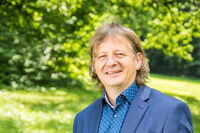 Ten years ago, he found out through a friend that Diaconia’s special needs school in Prague was looking for a new director. He had the qualification for such a position, but he did not have the experience. „I like accepting challenges and I had a feeling I would come across many of them at Diaconia,“ Milan Černý explains. In fact, he is facing one of the biggest challenges just now: the special needs school in Michle, called V Zápolí, needs to significantly broaden its capacity in order to be able to help more families that have children with a severe handicap.
Ten years ago, he found out through a friend that Diaconia’s special needs school in Prague was looking for a new director. He had the qualification for such a position, but he did not have the experience. „I like accepting challenges and I had a feeling I would come across many of them at Diaconia,“ Milan Černý explains. In fact, he is facing one of the biggest challenges just now: the special needs school in Michle, called V Zápolí, needs to significantly broaden its capacity in order to be able to help more families that have children with a severe handicap.
Why does the V Zápolí school need to be enlarged and cannot stay the way it is now?
he school is a much sought-after one and in the current situation, we are forced to turn down even applications from families that come from the neighbourhood. We don’t have enough space and it would be a mistake not to try and change that. The more kids attend our school, the more families we can support. A special needs school is a great deal of help to these families. At the V Zápolí school, we also urgently need a gym, as the kids really don’t have anywhere they can play. We also need a room that would serve for safely calming down our autistic students. We are also planning on building a training kitchen, because we want to teach our children to be as independent as possible, so that they are able to take care of themselves as best they can once they leave school.
How many students will your school be able to accept if you broaden the capacity?
Twice as much as now. At the moment, we have 48 students; after the renovation, we could have as much as nearly a hundred. We have also been considering the incorporation of a vocational training school for children with special needs. The new building should include a kindergarten and a 0th grade of elementary school, which would be separate from other classes.
How do you get money for such a large project?
Since our school is located in Prague, which is a rich region, we are out of luck in a way: we are not entitled to investment grants from the EU. We will have to find a different way to acquire the approx. 10 million CZK that we are still short of. First, we always turn to our students’ families, asking them for help. Some are able to make a donation, others spread the word and share the information about the renovation project with their friends. I have also addressed companies that have supported us before. I am also trying my luck with the Czech-Vietnamese association, as four Vietnamese students attend our school. Anybody can contribute to the renovation. We have a donation form on our website, through which anybody can send a donation, no matter how small or large.
You have already accomplished one big project, the school garden.
Yes, we are very proud of that. Other children’s families have helped us with it. For example, the father of one of the kids came to the garden with an excavator truck and got rid of all the concrete elements, another father donated 50,000 CZK. Basically, all the parents helped in any way they could and I appreciate that so much. Bit by bit, we managed to collect the necessary amount of money and created a garden with many sound toys, slides, a trampoline and various activities for developing motor skills. There is also plenty of space for rest as well as a gazebo. We also built a piece of pavement, where the kids can ride bikes and scooters, which, after all, is what they love the most.
In your view, is there anything that makes Prague’s special needs schools exceptional?
What makes us exceptional is that we take care of children with the most severe types of handicaps. We have students that would never be accepted at special needs schools administered by the state. Another thing that sets us apart is that our employees are people who actually want to do this job, they want to learn from each other and support each other. And I believe this is really happening. Each one of us is contributing to making everything work. I also believe that somehow, this shows through the parents and the kids.
Vendula Janů
PROTESTANT THEOLOGICAL FACULTY OF CHARLES UNIVERSITY (PTF CU)
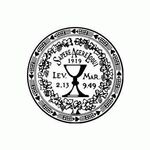 P. O. Box 529, Černá 9,
P. O. Box 529, Černá 9,
CZ 115 55 Praha 1, Czech Republic
Tel: (+ 420) 221 988 211; Fax: (+ 420) 221 988 215
E-mail: intl@etf.cuni.cz
Web page: http://web.etf.cuni.cz/ETFENG-1.html
The Protestant Theology Faculty of Charles University (PTF) is the successor of the Jan Hus Faculty (1919–1950) and the Comenius Faculty (1950–1990). In the year 1990 it was incorporated into Charles University. The administration of the Faculty is directed by a Dean and a board of Vice-Deans, elected for a four-year term of office. The Faculty offers study programmes at Bachelor's and Master's level in Protestant Theology, Diaconia (Pastoral and Social Work), and Ecumenical Studies, and at doctoral level in various theological fields. The faculty is ecumenically open to all. Pastors of the ECCB receive their theological education here.
Worthwhile exchange studies!
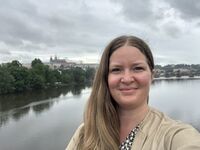 The 1st of February, in the middle of the Corona pandemic, I came to Prague to study one semester at the Protestant Theological Faculty at Charles University. It seems like I brought the Swedish winter with me on my journey, since I got to experience Prague beautifully covered in snow for several days. In the middle of that, Věra Fritzová and Kristýna Kadlecová from the faculty organized a walk, passing by some historical places. That was a great start on my semester in Prague!
The 1st of February, in the middle of the Corona pandemic, I came to Prague to study one semester at the Protestant Theological Faculty at Charles University. It seems like I brought the Swedish winter with me on my journey, since I got to experience Prague beautifully covered in snow for several days. In the middle of that, Věra Fritzová and Kristýna Kadlecová from the faculty organized a walk, passing by some historical places. That was a great start on my semester in Prague!
And this historical touch is something that I have appreciated so much with living in Prague. The rich Christian heritage makes studying theology very interesting. To study Systematic theology, from the perspective of a Czech theologian, while living in the Czech Republic, has widened my views on theological approaches. I remember that we were discussing how communism and the Velvet Revolution has affected theology, and also the way that the Czech people in general relate to Christianity. And at the very end of my stay, the 21st of June, I got to experience watching the historical film Jako letní sníh about the bishop Jan Komenský at Prague Old Square. This was on the day 400 years after the execution of 27 protestants at the very same place; an event that deeply influenced Komenský’s life.
Apart from the historical perspective, my courses at the faculty have been very worthwhile. The classes have been small, and it has all been online. But the topics have been interesting and thought-challenging, and it has been extremely valuable to discuss things with such knowledgeable teachers! Being on my third year of bachelor studies, this semester has taught me more than any other how to use the theological knowledge I have, in discussing relevant issues. I am very thankful to my teachers that have opened up so much space for questions and discussions, and guided us through the sometimes very complex matters. I believe that this is something that I will benefit from in my continued studies and ministry.
At the end, I am very glad I came to live in Prague, despite Corona. This way I could also experience the lovely spring and summer-start, and see a few of the amazing castles and cute towns and villages that are found all over the country. And I know that this is not the last time for me in this country!
Sofia Westerberg
Archaeological excavations in Tel Moca
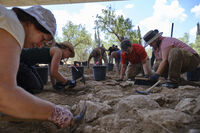 In August of this year, a group of teachers, employees and students of the Evangelical Theological Faculty of Charles University in Prague was selected for three-week archaeological excavations in the Tel Moca area. This happened after a one-year hiatus due to the Covid-19 pandemic. It was following excavations in the area from 2019.
In August of this year, a group of teachers, employees and students of the Evangelical Theological Faculty of Charles University in Prague was selected for three-week archaeological excavations in the Tel Moca area. This happened after a one-year hiatus due to the Covid-19 pandemic. It was following excavations in the area from 2019.
Tel Moca is located about 7 km from ancient Jerusalem and is the site of the biblical Moca of Jos. 18:26. Archaeological excavations have been carried out in this area before, but it was not until 1993, during the planned construction of a new road to Jerusalem, that the site was identified as an important archaeological site.
The excavations at this site are managed by Shu Kisilevitz (Tel Aviv University and the Israel Antiquities Authority) and prof. Oded Lipschits (Tel Aviv University). Partner institutions are also involved in the project: Osnabruck University in Germany and Charles University in Prague. In addition, volunteers from around the world can participate in the project.
Excavations will focus on the discovery of a temple complex from the Iron Age II (10th– 6th century BC). Archaeological excavation took place in two parts: eastern and western. In the eastern side, which adjoins the temple courtyard and where various interesting finds and cultural artifacts were found this year as well, and in the western part, where research focused mainly on finding and uncovering the western wall of the temple.
The temple discovered in this area corresponds to the biblical account of the First Temple, which should, however, lie in Jerusalem. That brings several questions. What is its connection to this temple? Can it be Solomon's Temple? Is it some other important temple, or is it just a kind of prayer house? Who was it consecrated to? And what does this mean for biblical research?
Another fact that makes the project unique is that most of the „diggers“ involved in this project are students of theology or theologians, supplementing and expanding their knowledge of current research in biblical archaeology. Together with volunteers from all over the world and locals from various professions and specialisations, they can get a glimpse of tangible history, experience and participate in archaeological research, physically demanding and very fine work, from digging through individual layers and destroying the foundations of younger buildings to sifting clay, collecting various fragments of pottery or bones and cleaning stones.
It was an interesting experience. To witness what archaeological work looks like, what needs to be measured, drawn, and accurately described, how ceramics are cleaned and determined, how samples are taken for various analyses. It was also important to have everything explained, to have an introduction to what we are digging, why we are uncovering which layer, how to do it, what tools we can work with, why is it happening and what we should probably expect. In the field, regional professional leaders took care of the explaining, and outside the field there were various professional lectures, workshops, discussions, and trips, which concerned archaeology and theology.
It was probably most interesting for me to see how we can get so much information from „picking“ in the clay. As from some „uninteresting“ stones, shards, clay, which seem ordinary to laymen at first glance, we can come with the help of various analyses and 3D modelling to a visually specific form of the place with specific acoustics, the expected impact of daylight on the interior object and other details.
Nevertheless, the work on these archaeological excavations in Tel Moca continues. The next season is scheduled for September 2022. The work should shed more light on the ambiguities presented and reveal the significance of this Jewish temple. I think there is definitely something to look forward to, and that soon enough we will hear about important findings such as the remains of a temple in Tel Moca.
Daniela Stehlíková
Technology & religion
 „Belief in technology represents a kind of modern eschatology – the belief that technology saves man and with it the world,“ says František Štěch from the Evangelical Theological Faculty of Charles University.
„Belief in technology represents a kind of modern eschatology – the belief that technology saves man and with it the world,“ says František Štěch from the Evangelical Theological Faculty of Charles University.
Mgr. František Štěch, Th.D., studied theology at the University of South Bohemia, where he taught until 2016. He gained experience at a number of foreign universities: in the Netherlands, Germany and the USA. It deals with fundamental theology, theological interpretation of the landscape and focuses on the study of the relationship between theology and new technologies. At the ETF CU, he leads an international research group dealing with the relationship between theology and contemporary culture and teaches at the Ecumenical Institute.
You address the impact of technology on humans in your project Christianity after Christianity: Exploring the Human Deal in the Digital Age. What is it?
We are talking about a holistic approach to the topic of human experience in the information society. The central hypothesis is that advanced information systems not only transform the human experience of the world or the construction of human identity, but also shape entire social and political structures. We believe that in this situation, theology represents a valuable point of view in trying to understand the changes in the contemporary world, including phenomena such as digitization or datafication of everything.
Try to explain to me how a theological view can be actually useful.
At least in two ways. First, theology can be useful in analyzing and criticizing technology as well as the technological way of thinking, and second, it reminds us again of the theme of freedom. Theology is not a simple critique of technology, but a rediscovery of man's free relationship to technology. And thus, it asks the question again: „Who is man in the face of new technologies?“ Even technologically advanced civilizations are not free of religious structures and concepts. These are often inconspicuously hidden in them, but they always somehow come to the surface. Belief in technology represents a kind of modern, secularized eschatology – the belief that technology saves man and with it the world. Some even create new religious movements and call for a so-called technological singularity – a turning point when the capabilities of machines surpass the capabilities of humans. I can mention a sect called Way of the Future, founded by former Google developer Anthony Levandowski. Its members believe in the divinity of artificial intelligence. But even futurologist Ray Kurzweil believes that thanks to the development of technology, one can attain immortality.
What else is interesting about this topic for theologists?
Another topic is creation. A person who exercises their freedom in a creative way creates new technologies to make their life easier, more pleasant, and thus becomes a creator, if you want a creator of technologies. Of course, they want to have control over their creation. But is it possible to fully control everything we create? The ability to predict human behavior was attributed to God (Leibniz) or angels (Thomas Aquinas). Today, algorithms of technological giants, such as Google, Amazon or Facebook, compete with them.
Religion meets technology. How is Christianity and its theology changing?
I do not know if it is possible to say exactly how Christianity and its theology change depending on new technologies. But I'm convinced that it's changing. Perhaps we could illustrate this with the example of the encounter of religion with a key technical medium such as the Internet. In the recent past, the American sociologist Christopher Helland distinguished between religion online and online religion. The former could be described as the static presence of religion or religious content on the Internet. It is a website of parishes or church congregations and such. This, of course, persists, but gradually improving technology has made it possible for "online religion" to emerge in the last two decades or so. In response to the covid-19 pandemic, many church activities have moved to a virtual environment. While the online transmission of services used to be an exception, this year it is a common practice for everyone.
Are you interested in any specific manifestations of this trend?
One Roman Catholic clergyman from Maryland responded creatively to the current situation and offered his believers a drive-thru sacrament of reconciliation, a confession. That is, „service“ delivered to the car, so that it is possible to maintain the prescribed distances for social contact. There is also a lot of talk in this context about the possibility of the sacrament of reconciliation online or by telephone. And related to this is the topic of using robots to perform a spiritual profession. In a Buddhist temple in Kyoto, Japan, there is already a spiritual robot known as Mindar, who blesses the believers and can even have a spiritual conversation with them! In 2017, on the occasion of the 500th anniversary of the Reformation in Germany, a BlessU-2 robot was programmed to bless the faithful. In five languages.
Isn't just the thought of a clergymen being represented by a robot, somewhat heretical?
It may seem that way to some, but I am thinking of St. Paul here when he writes in 1 Thessalonians (5:21), „Examine all things, hold fast to the good.“ And this comes to me as an important challenge. Personally, I can imagine that in the future, artificial intelligence can help clergy in Christian churches to create sermons, or it can completely replace them in this activity. It is also possible to program a robot to perform – and very accurately – some ritual action. It may not sound so heretical as amusing, but it raises serious questions: What is the nature and purpose of church preaching? How to understand the role of the clergy at present? What is important for it? What is the essence of the priesthood? And so on.
Then, cannot the faith that takes place between God and man become faith between God, the computer and man?
Christian theology defends the idea of creation. It continues the older Jewish tradition and claims that man was created in the image of God. The fact that man is imago Dei is proved by man's creative abilities, which in this view somehow reflect the work of God. People are like God. Can it not be that, in an effort to be like God, we create artificial intelligence for our image? To be a computer (or computer-controlled robot) as a human? The development of artificial intelligence is becoming a very interesting topic for Christian churches. And not just in terms of ethics. Questions related to the development of artificial intelligence can help us rethink not only the essence of humanity, but also the essence of religious faith.
Jiří Novák
